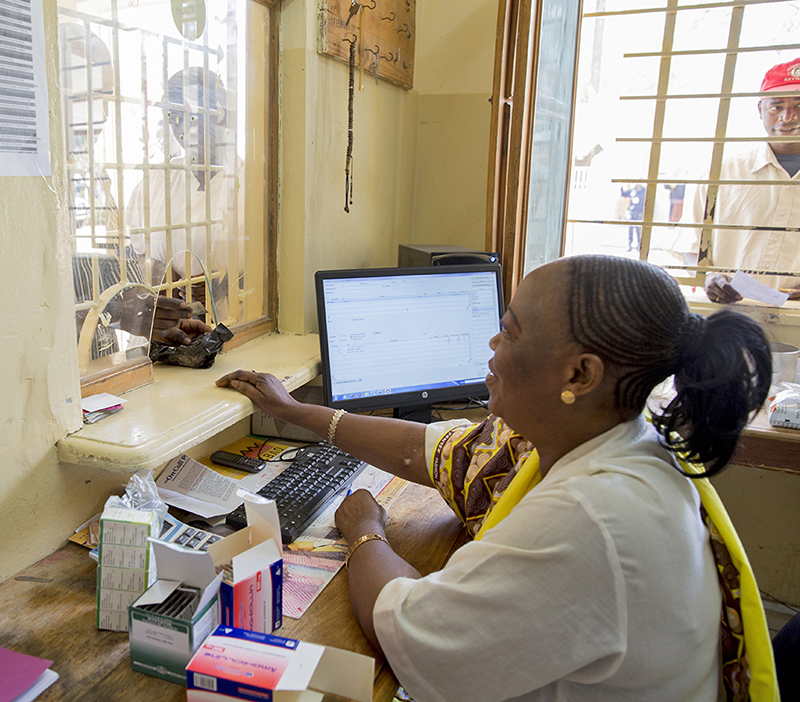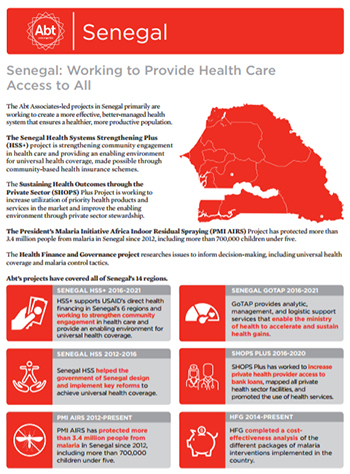Senegal: Strengthening a Health System to Provide Access to All
 Abt Global has been a partner with Senegal for more than two decades, primarily working to create a more effective, better-managed health system that ensures a healthier, more productive population.
Abt Global has been a partner with Senegal for more than two decades, primarily working to create a more effective, better-managed health system that ensures a healthier, more productive population.
In that time, Abt has helped Senegal design and implement a health coverage expansion focused on the most vulnerable citizens, improved the ability of Senegal’s government to manage its health system, has protected millions of Senegalese from malaria, and has reduced unnecessary barriers to trade while advocating for best business practices in the private sector.
The six Abt-led projects working in Senegal – five focused on health and one on economic growth – communicate with each other and share office space, staff, and logistics. They also work together to reach project objectives more efficiently. For example, when the public sector health projects discuss policy matters we make sure to include private sector health providers’ positions in the dialogue and to help the Senegalese government look holistically at providing access to health services through all sources of health care.
“Collaboration is much more than a philosophy. It's a strategy which we proactively pursue,” said Lisa Nichols, a principal associate for International Health at Abt with extensive experience working in Senegal.
Improving Health System Governance and Financing
 A key goal of development assistance is to help countries more independently manage and improve their own affairs – from education, to health, to economic development.
A key goal of development assistance is to help countries more independently manage and improve their own affairs – from education, to health, to economic development.
USAID’s government-to-government (G2G) national health system funding agreement in Senegal is a stepping stone toward that goal. Abt, through the Government Technical Assistance Provider (GoTAP) project, supports USAID and the Senegal Ministry of Health (MOH) in providing analytic, management, and logistic support services that enable the MOH to accelerate and sustain health gains with the help of G2G funding.
Similarly, the Senegal Health Systems Strengthening Plus (HSS+) project supports USAID’s direct health financing in Senegal’s six regions. HSS+ also is working to strengthen community engagement in health care and provide an enabling environment for universal health coverage, made possible through community-based health insurance schemes known as mutuelles.
“The goal here, ultimately, is to work ourselves out of a job by ensuring the Senegalese government has the leadership to finance and run its own health system,” Nichols said.
Read more about GoTAP and HSS+.
Click here to view the resource, "Senegal: Working to Provide Health Care Access to All" at full size.
Improving Health Outcomes through Increased Private Sector Engagement
"The goal here, ultimately, is to work ourselves out of a job by ensuring the Senegalese government has the leadership to finance and run its own health system."
— Lisa Nichols
Principal Associate, International Health
The Sustaining Health Outcomes through the Private Sector (SHOPS) Plus Project – USAID’s flagship initiative in private sector health – is working to increase utilization of priority health products and services in the market and improve the enabling environment through private sector stewardship. SHOPS Plus works on family planning, malaria, and maternal neonatal child and adolescent health, with an emphasis on public-private partnerships, and strategic innovations with a focus on supporting health enterprises, gender, and youth.
In the past year, SHOPS Plus has worked to increase private health provider access to bank loans, mapped all private health sector facilities, and promoted the use of health services through mobile outreach and social franchising, and products through social marketing.
Read more about SHOPS Plus in Senegal.
Reducing Barriers to Trade and Commerce
Senegal is a major shipping destination in West Africa and therefore should maximize its potential as a regional trading partner. That’s the purpose of the West Africa Trade and Investment Hub, led by Abt Global. The Trade Hub targets specific value chains — livestock and cereals for regional trade and mango and apparel for global trade — to improve the private sector’s performance while is working with other organizations to simplify transit procedures and expedite trade along key trade corridors, such as Dakar-Bamako.
Read more about the West Africa Trade Hub in Senegal.
Lessening the Burden of Malaria
Fevers are the number one reason families in Senegal seek health care. Therefore, reducing the burden of malaria in Senegal is an important way to relieve pressure on the country’s health system.
The President’s Malaria Initiative Africa Indoor Residual Spraying (PMI AIRS) Project is doing just that through indoor residual spraying (IRS), the application of insecticide to the inside of dwellings on ceilings, walls and other surfaces that serve as a resting place for malaria-infected mosquitoes. PMI AIRS has protected more than 3.4 million people from malaria in Senegal since 2012, including more than 700,000 children under five.
Decision making based on evidence is important in the fight against malaria. In collaboration with the Senegal National Malaria Control Program (NMCP), the Abt-led Health Finance and Governance project has conducted a cost-effectiveness analysis of the different packages of malaria interventions implemented in the country. The results of that study will enable the NMCP to more efficiently plan resources for its malaria elimination goal.
